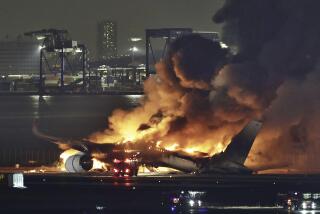Telair Turns Attention to Cockpit Safety
- Share via
In the race to develop a cockpit door that can stop terrorists, a Southern California aerospace company has developed a lightweight composite panel able to resist pistol shots, bomb blasts and pounding by sledgehammers.
Telair International, a Rancho Dominguez manufacturer with 175 employees, is expected to announce today that it will begin producing and marketing the composite panel, an outgrowth of research it was conducting for the federal government on bombproof airline cargo containers.
The application to cockpit doors is aimed at meeting new federal requirements that the airline industry beef up aircraft security in the aftermath of the Sept. 11 terrorist attacks.
The material, about a half-inch to one-inch thick and made with a combination of Kevlar and other compounds, recently passed ballistic tests in which it withstood repeated firings of high-caliber bullets at close range. Half the weight of other cockpit door materials, it did not buckle even after slammed with a sledgehammer.
Hardening cockpit doors has emerged as a top priority among airlines and aircraft makers as well as the federal government, which already has approved providing $500 million in grants to beef up aircraft security. Replacing cockpit doors is about the only physical change to jetliners now under discussion that might deter the sort of hijackings that culminated in the Sept. 11 attacks. Otherwise, the focus has been on procedural changes such as passenger screening and baggage checks.
According to industry figures, there are nearly 8,000 commercial passenger jets operating in the U.S. and all of them have to have their cockpit doors secured in some way. The Federal Aviation Administration instructed airlines Oct. 1 to secure cockpits in whatever way they can, regardless of design regulations, and submit a long-term proposal for a more uniform policy by April. Major airlines are already taking interim measures by installing metal crossbars on the doors.
No one knows for sure how big the market will be, but Honeywell International, one of the nation’s top aircraft electronics makers, said recently that retrofitting safety systems such as cockpit doors on existing commercial jets alone could bring in $500 million to $700 million in new sales for the company over the next five years.
Honeywell is among more than a dozen companies that have announced moves to build materials, provide technology or assemble sturdier doors, but Telair officials say their product has a competitive edge over the others.
“We’re optimistic that we’ll capture a significant portion of the business,” said Dennis K. Staver, a former Marine fighter pilot who runs the company. Previously known as Air Cargo Equipment Corp., the company was acquired last year by Teleflex Inc., a Plymouth Meeting, Pa.-based company that makes components for automobiles and boats as well as surgical equipment and aerospace parts.
Although the company comes late into the picture--most of its competitors already are marketing their products--Staver insisted that it has a better material and is better positioned than the others. It already has relationships with airlines and aircraft makers, as well as the manufacturing facility to produce the panels immediately.
“We’re in discussions with many of our customers,” Staver said. “Some are at the point of testing the panels, while others are already incorporating them into their designs.”
He declined to identify the customers out of fear of jeopardizing negotiations for orders.
Telair engineers had been working on bomb-resistant cargo containers for the FAA for four years and had developed a fabric-like material that could keep a blast confined to the affected container without damaging the aircraft.
The cargo container had just passed FAA bomb blast tests at Aberdeen Proving Grounds in Maryland when terrorists hijacked the jetliners.
As federal officials pieced together the attacks and flimsy cockpit doors became a focus of the investigation, a Telair engineer suggested to Staver that it wouldn’t be too hard to reapply the technology to hardening cockpit doors. In an all-night session, the engineers came up with a stiffer version of the cargo container material.
The composite panels have been undergoing tests in the last two months, including a ballistic test in which .44 magnum and 9mm bullets were fired into it from a distance of 16 feet. Bullets lodged in the panel without penetrating and causing serious structural damage.
Telair is not the first company to spin off existing technology in hopes of grabbing a share of new contracts and government grants. A private technology company in Egg Harbor Township, N.J., began touting its own hardened cockpit doors within days of Sept. 11.
Like Telair, the company, Galaxy Scientific Corp., already had experience in making blast-proof cargo containers and began promoting its design that it said is able to withstand bullets, grenades and a “determined attack by four muscular persons sustained for 20 minutes.”
Telair officials said that although their panels will be comparable in cost or slightly cheaper than Galaxy’s, they will be significantly lighter, thinner and more rigid. Galaxy, for instance, is selling a complete door for $50,000, of which panel material accounts for about 20% of the cost.
More to Read
Inside the business of entertainment
The Wide Shot brings you news, analysis and insights on everything from streaming wars to production — and what it all means for the future.
You may occasionally receive promotional content from the Los Angeles Times.








